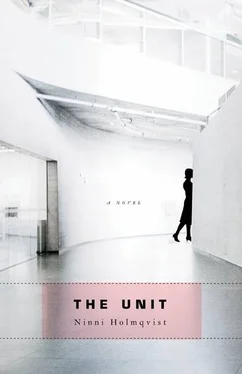
Copyright © 2006
Translated by Marlaine Delargy
It was more comfortable than I could have imagined. A room of my own with a bathroom, or rather an apartment of my own, because there were two rooms: a bedroom and a living room with a kitchenette. It was light and spacious, furnished in a modern style and tastefully decorated in muted colors. True, the tiniest nook or cranny was monitored by cameras, and I would soon realize there were hidden microphones there too. But the cameras weren’t hidden. There was one in each corner of the ceiling -small but perfectly visible-and in every corner and every hallway that wasn’t visible from the ceiling; inside the closets, for example, and behind doors and protruding cabinets. Even under the bed and under the sink in the kitchenette. Anywhere a person might crawl in or curl up, there was a camera. Sometimes as you moved through a room they followed you with their one-eyed stare. A faint humming noise gave away the fact that at that particular moment someone on the surveillance team was paying close attention to what you were doing. Even the bathroom was monitored. There were no fewer than three cameras within that small space, two on the ceiling and one underneath the washbasin. This meticulous surveillance applied not only to the private apartments, but also to the communal areas. And of course nothing less was to be expected. It was not the intention that those who lived here should be able to take their own lives or harm themselves in some other way. Not once you were here. You should have sorted that out beforehand, if you were thinking along those lines.
I was, for a while. I thought about hanging myself or jumping in front of a speeding train or doing a U-turn on the highway and driving toward the oncoming traffic at full speed. Or simply driving off the road. But I didn’t have the courage. Instead I just obediently allowed myself to be picked up at the agreed time outside my house.
The first snowdrops had just appeared in my flowerbeds, which had been blazing with yellow winter aconite for several weeks now. It was a Saturday morning. I had lit the fire earlier. A transparent, quivering plume of smoke was still rising from the chimney as I stood waiting by the side of the road outside the gate. There wasn’t a breath of wind, and the air was cold and clear.
The SUV was a metallic wine red, so shiny that it cast reflections of the sun as it slowly moved down the hill and through the village, then stopped in front of me. All the windows except the windshield and the front side windows were tinted black; apart from that the car was completely anonymous, with no logo or sticker to reveal where it had come from or where it was going. The driver, a woman in a black quilted jacket, climbed out and greeted me with a nod and a friendly smile. She hoisted my large suitcase into the trunk and waved me into the back seat. I fastened my seat belt and placed my shoulder bag on my knee, my arms around it. The driver put the car in first gear, released the handbrake, and we moved off. There were only the two of us in the car. We didn’t say anything to each other.
After a drive of about two hours, behind those windows that were so dark I would have found it difficult to follow our route even if I’d tried, or to work out in which direction I was being taken, we suddenly plunged downward and the sound of the engine and the tires changed and became muted and echoing at the same time, as if we were traveling through a tunnel. First it became darker, then lighter on the other side of the windows, then the car stopped and the engine was switched off. The door by the back seat where I was sitting was opened from the outside. I saw a man’s face and a woman’s face. The woman’s face was smiling, her mouth open, and she said:
“Hi there, Dorrit! You’ve arrived.”
I got out of the car and saw that I was in a parking lot, an underground one from the look of things. The man and the woman were both dressed in green shirts the color of linden flowers, with the logo of the unit in white on the breast pocket-I recognized it from the information packet that had been sent to me at home a few months earlier. The man and woman introduced themselves as Dick and Henrietta. Henrietta added:
“We’re your section orderlies.”
She went around the car, opened the trunk, lifted out my suitcase and set off toward a row of elevators at one end of the parking lot where some fifty cars were parked, most of them ordinary family cars, SUVs or minibuses, but I also saw a couple of ambulances. Dick picked up my shoulder bag from the concrete floor where I’d put it while I shook hands. I would have preferred to carry it myself, as it contained my most private possessions, but he insisted and I didn’t want to make a scene, so I shrugged my shoulders and let him take it. He gestured toward the elevators. I followed Henrietta empty-handed with him directly behind me.
The elevator went up only one floor. When we got out, Dick said:
“We’re on level K1 now. That’s the upper basement floor.”
We walked along a wide corridor with a red ceiling, floor, and walls until we reached another row of elevators. We got into one of them, went up several floors and came out into something that resembled an ordinary stairwell with two doors that looked like ordinary apartment doors, one at each end. Dick, who had less to carry of the two functionaries, went ahead and pushed open one of the doors labeled SECTION H3 and held it open for me. I walked into an open common room of the kind usually found in hospital wards or student corridors, a lounge really. On a sofa in the corner sat a woman with red frizzy hair, just starting to turn gray, reading a magazine. In front of her on the table was a steaming cup of tea. Judging by the aroma, it was peppermint. The woman looked up, smiling.
“This is Majken,” said Henrietta. “And this is Dorrit.”
I managed to croak something that was supposed to be hello, and noticed that my mouth was completely dry.
“I live two doors down from you,” said Majken. “If there’s anything you’re not sure about, or if you just want to talk-or not even that; if you want to be quiet in someone’s company, or anything at all-then I’m either here or in my room for the next few hours. It says Majken Ohlsson on my door.”
“Okay,” I managed to get out.
She looked at me, her gaze steady. Her eyes were flecked with green.
“Don’t hesitate,” she added. “You mustn’t feel you’re disturbing me. We always have time for each other here.”
“Okay,” I said again. Then I thought I ought to say something else, so I said: “Thanks.”
A hallway led off the lounge, with five doors along one side. On the second door was my name. Dick pushed down the door handle, opened the door, and we walked straight into the living room.
Henrietta put my suitcase down on the floor. Dick placed the shoulder bag on top of it, then turned to me and asked pleasantly:
“Would you like us to stay for a while?”
“No,” I replied, a fraction less pleasantly.
“In that case we’ll leave you in peace,” he said. “Just don’t forget the orientation meeting at two o’clock.”
He looked at me searchingly, as if to check that I could really manage all on my own until two o’clock. I couldn’t help snorting. Then they left, closing the door behind them.
So there I stood.
It was warm in the room; it must have been about seventy degrees. I wasn’t used to such a high temperature indoors, especially not at this time of year. I shrugged off my peacoat, untied my winter boots, took off my cardigan and finally my socks. For the time being I just left everything lying in a heap on the floor. I stood next to the heap, barefoot, contemplating a simple beechwood dining room set, a deep sofa and two armchairs upholstered in eggshell white; at the far side of the room in an alcove was a desk. To my left, the kitchenette, to my right, the bathroom door, and next to that the bedroom, with the door standing open. To my surprise I saw that there was a double bed in there. I’d never had a double bed in my entire life. I laughed, and that was when I heard the faint hum of one of the cameras for the first time, as it turned its little dark eye toward me and-or so I imagined-zoomed in on my face. I automatically looked away.
Читать дальше













